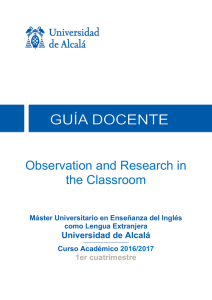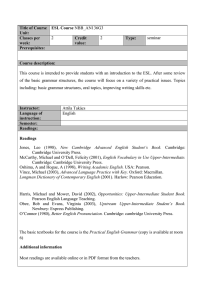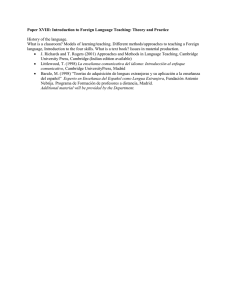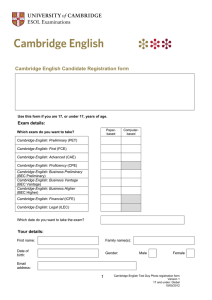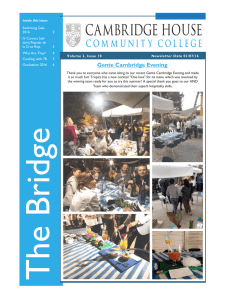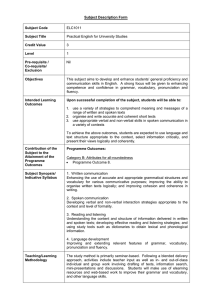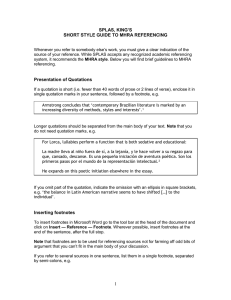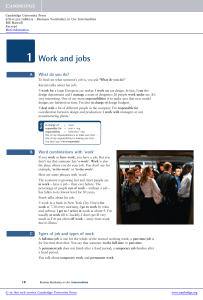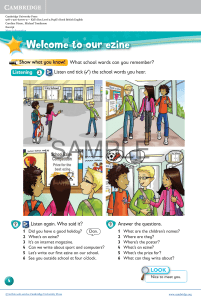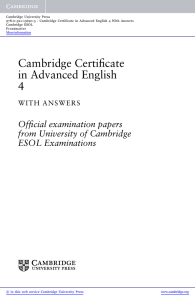© Cambridge University Press www.cambridge.org Cambridge
Anuncio
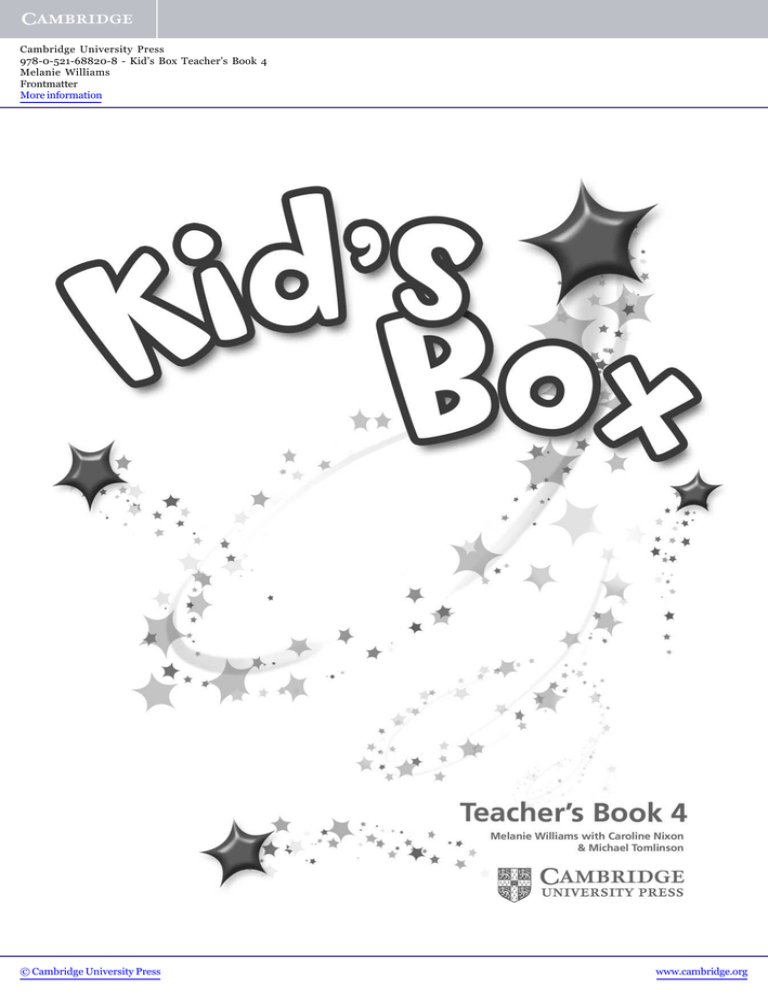
Cambridge University Press 978-0-521-68820-8 - Kid’s Box Teacher’s Book 4 Melanie Williams Frontmatter More information © Cambridge University Press www.cambridge.org Cambridge University Press 978-0-521-68820-8 - Kid’s Box Teacher’s Book 4 Melanie Williams Frontmatter More information CAMBRIDGE UNIVERSITY PRESS Cambridge, New York, Melbourne, Madrid, Cape Town, Singapore, São Paulo, Delhi Cambridge University Press The Edinburgh Building, Cambridge CB2 8RU, UK www.cambridge.org Information on this title: www.cambridge.org/9780521688208 © Cambridge University Press 2009 This publication is in copyright. Subject to statutory exception and to the provisions of relevant collective licensing agreements, no reproduction of any part may take place without the written permission of Cambridge University Press. First published 2009 Printed in the United Kingdom at the University Press, Cambridge A catalogue record for this publication is available from the British Library ISBN 978-0-521-68820-8 Teacher’s Book 4 ISBN 978-0-521-68818-5 Pupil’s Book 4 ISBN 978-0-521-68819-2 Activity Book 4 ISBN 978-0-521-68821-5 Teacher’s Resource Pack 4 ISBN 978-0-521-68822-2 Audio CDs 4 ISBN 978-0-521-68842-0 Language Portfolio 4 ISBN 978-0-521-6883-76 Interactive DVD 4 (PAL) ISBN 978-0-521-73607-7 Interactive DVD 4 (NTSC) Cambridge University Press has no responsibility for the persistence or accuracy of URLs for external or third-party Internet websites referred to in this publication, and does not guarantee that any content on such websites is, or will remain, accurate or appropriate. Information regarding prices, travel timetables and other factual information given in this work are correct at the time of first printing but Cambridge University Press does not guarantee the accuracy of such information thereafter. © Cambridge University Press www.cambridge.org Cambridge University Press 978-0-521-68820-8 - Kid’s Box Teacher’s Book 4 Melanie Williams Frontmatter More information Con en s Map of the course 4 Introduction 6 Introductory Unit Hello there! 12 Unit 1 Back to school 18 Unit 2 Good sports 26 Review Units 1 and 2 34 Unit 3 Health matters 36 Unit 4 After school club 44 Review Units 3 and 4 52 Unit 5 Exploring our world 54 Unit 6 Modern life 62 Review Units 5 and 6 70 Unit 7 At the zoo 72 Unit 8 Let’s party! 80 Review Units 7 and 8 88 Photocopiable activities 90 Extra activities 101 Extra project ideas 114 Movers Practice Test audio script and key 118 © Cambridge University Press www.cambridge.org Cambridge University Press 978-0-521-68820-8 - Kid’s Box Teacher’s Book 4 Melanie Williams Frontmatter More information Map of he course Unit Key language Key vocabulary Additional language Pronunciation Content lessons Introductory greetings, comparative Unit adjectives, personal Hello there! description, definitions, present simple, adverbs of frequency, imperatives, love -ing, want to be, would like to, have got, must, before/after jobs, family, adjectives, routine activities character names, no time to lose the phonemes /u/, /ai/, /əυ/, /aυ/, /ei/, /‰/ 1 Back to school relative clauses with who, adjectives, present simple, descriptions, present continuous question forms, must, can, What does x mean? school, school subjects, boring, quick, exciting, busy, careful, difficult, easy, slow, terrible, pottery, bowl, playground, Four fat elephants are laughing at funny photos, Fifteen dolphins are phoning their favourite friends school show, He’s / she’s called, over there, He’s / she’s the one … , We measured mass/volume/length. the phoneme /f/, mathematics/ mathematician measuring quantity and space, tape measure, millimetre, centimetre, metre, millilitre, centilitre, litre, length, quarter, shopping bag, relative clauses with which 2 Good sports relative clauses with where, want to learn to do (something), want to / doesn’t want to, mustn’t, What do we call people who … ?, adverbs of manner learning to (swim), climb, sail, rock climbing, climbing wall, water sports, It means a place where … , activity centre, good swimmer, lose, equipment, well, quickly, slowly, carefully, badly, quietly, easily, happily, fall, verse, chorus, drop, very (+ adverb), roller skating, syllable How’s she doing?, good at, bad at, round and round, over the ground, lots of fun, up the wall, the tallest words with one, two and three syllables sports and rules, have to (obligation), pitcher, bat, batter, run (n), first/second/third/fourth base, arrive, basket, baseball field, balloon the human body, bones, blood, blood group, blood cell, muscles, heart, lungs, beat, chest, pass, layer, tennis court, breathe, carry, stretch, diameter, medical check ups, eye test Review procedural language Units 1 and 2 for games, functional language: offers, suggestions, openers and responses word families 3 Health matters past simple irregular verbs: affirmative, negative, question forms and short answers, clauses with because, any + noun What was the matter with you?, ill, tests, exam, dream, bowl I was the first to finish, fish and chips, diary, health matters, awake, eye test, time to stop, take it off, really tired/difficult, all night, What was wrong with (the woman)?, categories, the most common type, an average of … , more quickly, open them out, as big as … , balloon stretch method, to test lung capacity, vital capacity, on each side the phonemes /e/ and /i/ 4 After school club past simple regular verbs: affirmative and questions, spelling of -ed endings, present simple after school club, hall, play chess, school show, a musical, pirate, kids, ordinal numbers: first–twentieth, Nobel prize, medals, Olympic Games, Mount Everest, the moon start to do something, vowel, consonant, playtime, out of order, repairman, out of breath, in line, league, Neverland consonant clusters, story genres, atlas, rhyming words literature, poem, novel, play, owl, pussycat, pea-green, honey, plenty of money, wrapped up, five-pound note, author, theatre, was written, adventures, actor Review procedural language for Units 3 and 4 games days of the week, word families 4 Kid’s Box Teacher’s Book 4 © Cambridge University Press www.cambridge.org Cambridge University Press 978-0-521-68820-8 - Kid’s Box Teacher’s Book 4 Melanie Williams Frontmatter More information Unit Key language Key vocabulary Additional language Pronunciation Content lessons 5 Exploring our world could/couldn’t: ability + short answers, past simple irregular verbs, clauses with so, comparative of two- and three-syllable adjectives, possessive and adjectival pronouns explorer, expedition, British, cross, ice, open sea, save, continent, Natural History Museum, exhibition, school trip, polar bear, spider, store, text message, protect (the environment) Sir Earnest Shackleton, Antarctica, We have to look after our world, That’s true, make mistakes, adventure holidays, brochure, tandem, insects, birds, reptiles, amphibians consonant clusters: endangered sea /tr/, /str/, /sp/, /sk/ creatures, ocean life, endangered, polar bear, sea turtle, whale, like (the polar bear), Arctic, type, fewer fish, mammals, between (x and y), imperatives, countries, present simple 6 Modern life instructions, past simple irregular verbs modern life, button, computer, MP3 player, DVD, email, mouse, program, screen, video, the Internet, click, text, film, music/video clip, radio, choose, turn it on, know how to do something, get up, get dressed, take off, put on, o’clock, potato, pop music, plant, erase Can you show us, please?, I don’t need any more, works perfectly well, problem, really good one, How exciting!, CCTV, row, real rhyming words, photographs, photography photographs, photography and film, family snaps, the biggest camera, art photography, sculpture, landscapes, history of the cinema, realism, film and different genres Review procedural language for Units 5 and 6 games stay where you are, go back to where you were, word families 7 At the zoo superlative adjectives: the -est, the most, the best, the worst, past simple regular and irregular verbs, prepositions: into, round, out of cheetah, puppies, kittens, cubs Now tell us about … , Let’s hear it … , five points for each fact, baby animals, the most wanted, semi-breve, crotchet, quaver, semi-quaver, treble clef rhyming words music and musical sounds, Mozart, (musical) notes, compose, composers, bumble bee, cuckoo, hum, whole notes, half notes, quarter notes, eighth notes, pitch, octave, English notation: C, D, E, F, G, A, B, comparative adverbs 8 Let’s party! want someone to do something, expressions of quantity, e.g. a bottle of, preposition: in front of, superlative adverbs, e.g. the most quickly/carefully, past simple salad, pasta, sandwiches, soup, jacket potato, (baked) beans, a bowl of … , a bottle of … , a cup of … , a glass of … , fancy dress party, well, sack race Can you pass … ?, Could you put … ?, third place, It’s time to fly, The party’s over, Take me away, arrest, If you are (hungry between meals), eat (fruit), more, less rhyming words, homophones: right, write, buy, by, wear, where, I, eye, knows, nose, two, too, ate, eight, new, knew food and nutrients, carbohydrates, vitamins and minerals, calcium, protein, fats and sugars, fuel, energy, teaspoon, balanced diet, vegetarian, recipe, oil, preparation, mix Review procedural language for Units 7 and 8 games word families Map of the course 5 © Cambridge University Press www.cambridge.org
